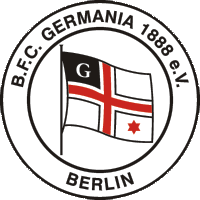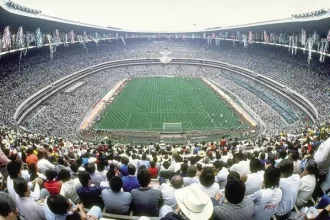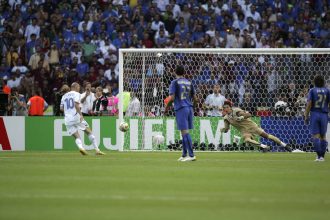The story of the first FIFA World Cup in 1930 is an exciting tale of international cooperation, fierce competition, and unforeseen obstacles.
The tournament was hosted in Uruguay, which was an unlikely choice at the time given its small size and remote location in South America. But Uruguay’s passion for soccer was unmatched, and its leaders were determined to make the World Cup a success.
The 1930 FIFA World Cup was the first-ever World Cup and took place during the Great Depression in Europe. Many European teams were hesitant to participate due to the cost of travel and the fear of losing their jobs as football players were not yet professionals. The controversy around allowing professionals to participate also caused some countries to refuse to take part, such as Denmark, Germany, and England. In the end, only three European nations sent teams to Uruguay, and none of them were among the highest-ranked teams.
The tournament was played with a group phase followed by semi-finals and a final, and Uruguay was the favorite to win. The closest rival, Argentina, had won the South American Championship in 1929, and Brazil was ill-prepared. The European teams suffered from travel conditions, spending ten days on a boat without the chance for training. The group phase was implemented to allow the long-distance teams to play at least two games.

Yugoslavia and USA surprised many by winning their groups and advancing to the semi-finals. The USA was defeated by Argentina, while Uruguay defeated Yugoslavia by a large margin. In the final, Uruguay faced Argentina, who had been their opponents in the final of the 1928 Olympics tournament. Uruguay won the game 4-2 in the presence of over 80,000 people at Estadio Centenario in Montevideo.

The champion team of Uruguay:
Enrique Ballestero (Goalkeeper)
Ernesto Mascheroni (Defender)
Joséo Nasazzi (Defender)
José Leandro Andrade (Midfielder)
Lorenzo Fernández (Midfielder)
Álvaro Gestido (Midfielder)
Héctor Scarone (Forward)
Pablo Dorado (Forward)
Pedro Cea (Forward)
Santos Iriartre (Forward)
Héctor Castro (Forward)
Head coach: Alberto Suppici
Participating teams:
- Argentina
- Belgium
- Brazil
- Bolivia
- Chile
- France
- Mexico
- Paraguay
- Peru
- Romania
- United States
- Uruguay
- Yugoslavia
1st, 2nd and 3rd places
- Uruguay
- Argentina
- Yugoslavia/United States
Top scorers
- Guillermo Stábile (8 goals)
- Pedro Cea (5 goals)
- Guillermo Subiabre (4 goals)
Cities and stadiums
- Montevideo (Estadio Centenario)
- Montevideo (Estadio Gran Parque Central)
- Montevideo (Estadio Pocitoseight)
Average attendance: 24,139
The victory renewed the status of the Uruguay team as the pride of the nation. However, the friendship between Uruguay and Argentina was affected negatively after the final due to threats made to players and harassment of supporters. The Uruguayan embassy in Buenos Aires was vandalized, and the government cut off relations with its neighboring country.





